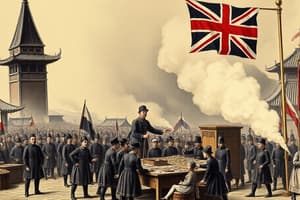Podcast
Questions and Answers
What was one of China's main goals during the Opium Wars?
What was one of China's main goals during the Opium Wars?
- To expand its imperial interests in Britain
- To ban opium and end the opium trade (correct)
- To establish a monopoly on the opium trade
- To limit its trade with European nations
What was a key aspect of the Treaty of Nanjing?
What was a key aspect of the Treaty of Nanjing?
- China gained control of Hong Kong
- Britain's opium trade was banned
- China's import taxes on British goods increased
- Great Britain gained control of the Chinese island of Hong Kong (correct)
What was a primary motivation for the British during the Opium Wars?
What was a primary motivation for the British during the Opium Wars?
- To limit British trade with China
- To promote free trade and economic interests (correct)
- To protect Chinese sovereignty
- To end the opium trade
What did the Treaty of Nanjing force China to do?
What did the Treaty of Nanjing force China to do?
What did the British use as a pretext to expand their imperial interests in China?
What did the British use as a pretext to expand their imperial interests in China?
What was one of the consequences of the Treaty of Nanjing for British citizens?
What was one of the consequences of the Treaty of Nanjing for British citizens?
What was the main motivation behind the spread of Christianity during the age of exploration?
What was the main motivation behind the spread of Christianity during the age of exploration?
What was the primary goal of the Gold motivation during the age of exploration?
What was the primary goal of the Gold motivation during the age of exploration?
What is the primary characteristic of a slave?
What is the primary characteristic of a slave?
What was the Atlantic Slave trade?
What was the Atlantic Slave trade?
What was a major factor that contributed to the existence of the slave trade?
What was a major factor that contributed to the existence of the slave trade?
What were the three main motivations behind the age of exploration?
What were the three main motivations behind the age of exploration?
What was the primary reason behind the British frustration with the Chinese trade system?
What was the primary reason behind the British frustration with the Chinese trade system?
What was the turning point that led to the initiation of trade between the British and the Chinese?
What was the turning point that led to the initiation of trade between the British and the Chinese?
What was the Chinese perception of their place in the world?
What was the Chinese perception of their place in the world?
What was the result of the British efforts to negotiate with the Chinese Emperor?
What was the result of the British efforts to negotiate with the Chinese Emperor?
What was the driving force behind the British efforts to trade with China?
What was the driving force behind the British efforts to trade with China?
What was the impact of internal and external troubles on China's perception of itself by 1900?
What was the impact of internal and external troubles on China's perception of itself by 1900?
Flashcards are hidden until you start studying
Study Notes
British Reactions and the Opium War
- The British viewed China as being out of touch with "civilized" nations that practiced free trade.
British Interests and Demands
- The British wanted to continue the opium trade and protect free trade.
- Their ultimate goal was to force China to open its doors to more foreign trade.
Chinese Interests and Demands
- China wanted to ban opium and end the opium trade.
- China wanted to protect its sovereignty and have the British respect Chinese laws on Chinese land.
- The ultimate goal was to remove the British from China.
Treaty of Nanjing (August 9, 1842)
- Article IIe: British citizens gained the freedom to trade in Canton, Amoy, Fuchow, Ningpo, and Shanghai.
- Article III: Great Britain gained ownership of the Chinese island of Hong Kong.
- Article VII: China's government had to pay Great Britain's government twenty-one million silver dollars.
- Article IX: China could not punish anyone for trading with British citizens.
- Article X: British goods could not have a high import tax (tariff) on them.
The Three G's: God, Gold, and Glory
- God: Spread Christianity and bring "civilization" to the rest of the world through missionaries and humanitarian work.
- Gold: Attain necessary resources, labor, land, and luxury goods, and open new trade routes and markets through gunboat diplomacy.
- Glory: Bring national pride, spread "superior" culture, and attain power and military might.
History of the Slave Trade
- A slave is owned by another person, classified as property, and works for nothing, with no freedom, money, or choice.
- The slave trade was driven by beliefs, economic gain, and religion.
- The Atlantic Slave Trade (1400-1800) occurred between Europe, Africa, and the Americas.
Background to the Opium War
- European countries initially traded with China with some restrictions, but as time passed, the rules increased and tightened.
- By the 18th century, all trading was centered in Canton, which frustrated the Europeans.
- The British sent a representative to China with three goals, but the Emperor declined due to confusion, and Britain failed in its negotiations.
- The British banks were low, and they had to find something the Chinese wanted to initiate trade, which led to the introduction of opium.
Studying That Suits You
Use AI to generate personalized quizzes and flashcards to suit your learning preferences.




